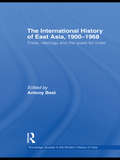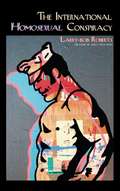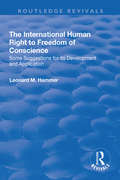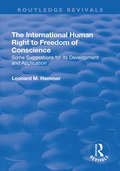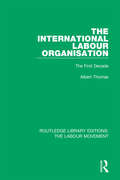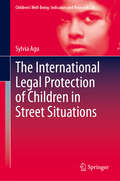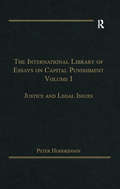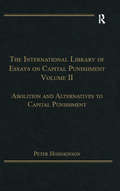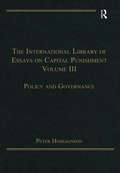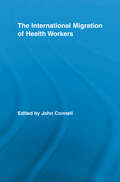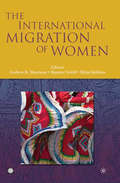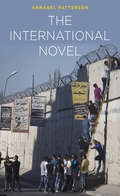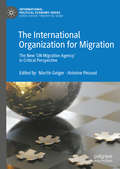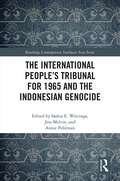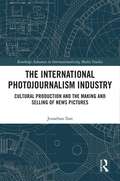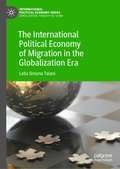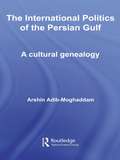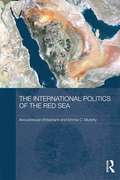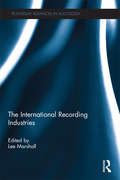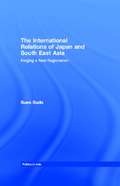- Table View
- List View
The International History of East Asia, 1900-1968: Trade, Ideology and the Quest for Order (Routledge Studies in the Modern History of Asia)
by Antony BestThis book provides a broad account of the international history of East Asia from 1900 to 1968 - a subject that is essential to any understanding of the modern epoch. Whereas much of the scholarship on this subject has focused purely on the immediate origins and consequences of violent events such as wars and revolutions, this book demonstrates the importance of also considering other forces such as ideology, trade and cultural images that have helped shape East Asian international history. It analyses how the development of the region was influenced by ideological competition and ‘orientalism’, by both multilateral and unilateral efforts to instil order, and by the changing nature of international trade. It considers a number of important topics such as the concept of the ‘open door’; the rise and influence of progressive internationalism in the forum of the League of Nations; the development of anti-colonial nationalism and anti-Western internationalism in the shape of pan-Asianism; and the onset of the Cold War. It also includes detailed case studies of subjects including the administration of the Chinese Maritime Customs Service; the international effort to regulate the trade in opium; and the significance of intra-Asian trade. Overall, this book constitutes an impressive account of the international history of East Asia, and is an important contribution to the interpretive study of this crucial period of history.
The International Homosexual Conspiracy
by Larry-Bob RobertsWith 101 satirical essays, including "I Want to be a Gay Wingnut," "It's Not Easy Being an Arrogant Know-it-all," "Everyone's a Semiotician," and "The Disappearance of the Inexplicable," as well as the title essay, author Larry-bob Roberts has written a laugh-out-loud collection of satirical rants and raves commenting on modern society which would make Jonathan Swift proud.
The International Human Right to Freedom of Conscience: Some Suggestions for Its Development and Application (Routledge Revivals Ser.)
by Leonard HammerThis title was first published in 2002: This text addresses the problem of conflict that arises between the human right to freedom of religion and the human right to freedom of belief, for example, certain religious beliefs are in conflict with certain women's rights. The pricipal goal of this book is to distinguish between the more formalized, and recognized, notion of protecting religious beliefs from what is referred to as conscientious beliefs - a belief external to a religious context.
The International Human Right to Freedom of Conscience: Some Suggestions for Its Development and Application (Routledge Revivals)
by Leonard M HammerThis title was first published in 2002: This text addresses the problem of conflict that arises between the human right to freedom of religion and the human right to freedom of belief, for example, certain religious beliefs are in conflict with certain women's rights. The pricipal goal of this book is to distinguish between the more formalized, and recognized, notion of protecting religious beliefs from what is referred to as conscientious beliefs - a belief external to a religious context.
The International Labour Organisation: The First Decade (Routledge Library Editions: The Labour Movement #40)
by Albert ThomasFirst published in 1931. This study was written by various officials of the International Labour Office, and provides an overview of the work of this institution as it was in the years after its initial formation. The authors provide a full and systematic description of the activities within the organisation, and will be of great interest to scholars and students of political and labour history.
The International Law of Human Trafficking
by Anne T. GallagherAlthough human trafficking has a long and ignoble history, it is only recently that trafficking has become a major political issue for states and the international community and the subject of detailed international rules. This book presents the first-ever comprehensive and in-depth analysis of the international law of human trafficking. Anne T. Gallagher calls on her direct experience working within the United Nations to chart the development of new international laws on this issue. She links these rules to the international law of state responsibility as well as key norms of international human rights law, transnational criminal law, refugee law, and international criminal law, in the process identifying and explaining the major legal obligations of states with respect to preventing trafficking, protecting and supporting victims, and prosecuting perpetrators. This is a timely and groundbreaking work: a unique and valuable resource for policymakers, advocates, practitioners, and scholars working in this new, controversial, and important field.
The International Law of Migrant Smuggling
by Anne T. Gallagher AO Fiona DavidWhether forced into relocation by fear of persecution, civil war, or humanitarian crisis, or pulled toward the prospect of better economic opportunities, more people are on the move than ever before. Opportunities for lawful entry into preferred destinations are decreasing rapidly, creating demand for a range of services that is increasingly being met by migrant smugglers: individuals or criminal groups who facilitate unauthorized entry into in another country for profit. This book, a companion volume to the award-winning The International Law of Human Trafficking, presents the first-ever comprehensive and in-depth analysis of the international law of migrant smuggling. The authors call on their direct experience of working with the United Nations to chart the development of new international laws and to link these specialist rules to other relevant areas of international law, including law of the sea, human rights law, and international refugee law. Through this analysis, the authors identify and explain the major legal obligations of States with respect to migrant smuggling, including those related to criminalization, interdiction and rescue at sea, protection, prevention, detention, and return.
The International Legal Framework on Violence Against Women: The Need for Reform (Routledge Research in Human Rights Law)
by Ronagh J.A. McQuiggThis book provides in-depth critical analysis of the international legal framework on violence against women and, crucially, the need for reform of this framework. Violence against women occurs in every state worldwide and constitutes one of the most prevalent human rights abuses at the global level. However, none of the UN treaties refer specifically to violence against women. The book argues that there is a pressing need for legally binding provisions to be adopted at the global level on this issue. Two forms which such provisions could take are considered. These are, firstly, an Optional Protocol to the UN Convention on the Elimination of All Forms of Discrimination Against Women; and secondly, a stand-alone UN treaty on violence against women. The book’s intended audience includes academics and researchers from a wide variety of disciplines, such as human rights, international law, criminal law, criminology, social policy, gender studies and sociology; as well as practitioners and those in the voluntary sector who are working in the area of combating violence against women. The book could also be used beneficially on courses at both undergraduate and postgraduate levels which incorporate the topic of violence against women.
The International Legal Protection of Children in Street Situations (Children’s Well-Being: Indicators and Research #29)
by Sylvia AguThe book conducts a comprehensive analysis of codified international legal instruments and documents in their application to children in street situations, employing soft law documents to elucidate treaty interpretation and supplement existing legal standards. The research adopts a holistic approach, correlating international legal instruments with root causes and consequences for children in street situations, while systematically examining issues of intersectionality, such as economic, social, and cultural rights, civil and political rights, minority rights including disability rights, rights of the girl-child, as well as LGBTQI+ and migrant rights, reparations, impact of violence, and access to essential services like health, food, and housing, with various human rights issues, including economic, social, cultural, and civil-political rights. It presents the plight of children in street situations as a human rights concern, offering guidance on utilising international legal sources in rights claims procedures. The study also integrates sociological and political perspectives with legal and governmental policy issues, examining the influence of external factors such as conditional lending and structural adjustment programmes, wars, and decolonisation on social policies and their consequent impact on children and families by rendering children in street situations 'visible' as a distinct category requiring urgent attention in State policy formulation. By systematically integrating international legal instruments with practical policy considerations and applications concerning children in street situations, this scholarly work serves as a comprehensive legal framework for State governments, their bodies and social workers, and a valuable advocacy guide for interest groups including non-governmental organisations, proposing future directions for policy and research for addressing the rights and needs of children in street situations.
The International Library of Essays on Capital Punishment, Volume 1: Justice and Legal Issues (The International Library of Essays on Capital Punishment)
by Peter HodgkinsonThis volume provides up-to-date and nuanced analysis across a wide spectrum of capital punishment issues. The essays move beyond the conventional legal approach and propose fresh perspectives, including a unique critique of the abolition sector. Written by a range of leading experts with diverse geographical, methodological and conceptual approaches, the essays in this volume challenge received wisdom and embrace a holistic understanding of capital punishment based on practical experience and empirical data. This collection is indispensable reading for anyone seeking a comprehensive and detailed understanding of the complexity of the death penalty discourse.
The International Library of Essays on Capital Punishment, Volume 2: Abolition and Alternatives to Capital Punishment (The International Library of Essays on Capital Punishment)
by Peter HodgkinsonThe essays selected for this volume develop conventional abolition discourse and explore the conceptual framework through which abolition is understood and posited. Of particular interest is the attention given to an integral but often forgotten element of the abolition debate: alternatives to capital punishment. The volume also provides an account of strategies employed by the abolition community which challenges tired methodologies and offers a level of transparency previously unseen. This collection tackles complex but fundamental components of the capital punishment debate using empirical data and expert observations and is essential reading for those wishing to comprehend the fundamental issues which underpin capital punishment discourse.
The International Library of Essays on Capital Punishment, Volume 3: Policy and Governance (The International Library of Essays on Capital Punishment)
by Peter HodgkinsonThis volume provides analyses of a range of subjects and issues in the death penalty debate, from medicine to the media. The essays address in particular the personal complexities of those involved, a fundamental part of the subject usually overridden by the theoretical and legal aspects of the debate. The unique personal vantage offered by this volume makes it essential reading for anyone interested in going beyond the removed theoretical understanding of the death penalty, to better comprehending its fundamental humanity. Additionally, the international range of the analysis, enabling disaggregation of country specific motivations, ensures the complexities of the death penalty are also considered from a global perspective.
The International Migration of German Great War Veterans
by Erika KuhlmanThis book usesstory-telling to recreate the history of German veteran migration after theFirst World War. German veterans of the Great War were among Europe's mostvolatile population when they returned to a defeated nation in 1918, aftergreat expectations of victory and personal heroism. Some ex-servicemen chose toflee the nation for which they had fought, and begin their lives afresh in thenation against which they had fought: the United States.
The International Migration of Health Workers
by Rebecca S. ShahExperts from ethicists and political philosophers to clinicians and trade unionists seek answers to a number of key ethical questions to further a deeper understanding of the ethics of health worker migration.
The International Migration of Health Workers (Routledge Research in Population and Migration)
by John ConnellThis volume provides the first detailed overview of the growing phenomenon of the international migration of skilled health workers. The contributors focus on who migrates, why they migrate, what the outcomes are for them and their extended families, what their experiences in the workforce are, and ultimately, the extent to which this expanding migration flow has a relationship to development issues. It therefore provides new, interdisciplinary reflections on such core issues as brain drain, gender roles, remittances and sustainable development at a time when there has never been greater interest in the migration of health workers.
The International Migration of Women
by Maurice Schiff Andrew R. Morrison Mirja SjöblomThe current share of women in the world's international migrant population is close to one half. Despite the great number of female migrants and their importance for the development agenda in countries of origin, there has until recently been a striking lack of gender analysis in the economic literature on international migration and development. This volume makes a valuable contribution in this context by providing eight new studies focusing on the nexus between gender, international migration, and economic development.
The International Novel
by Annabel PattersonAnnabel Patterson here turns her well-known concern with political history in early modern England into an engine for investigating our own era and a much wider terrain. The focus of this book is, broadly, nationalism and internationalism today, approached not theoretically but through the lens of fiction. Novels are uniquely capable of dealing with abstract problems by embodying them in the experience of persons, thereby rendering them more "real." Patterson takes twelve novels from (almost) all over the world: India, Africa, Turkey, Crete, the Balkans, Palestine, Afghanistan, South America, and Mexico, novels which illustrate the dire effects of some of the following: imperialism, partition, annexation, ethnic and religious strife, boundaries redrawn by aggression, the virus of dictatorships, the vulnerability of small countries, and the meddling of the Great Powers. All are highly instructive, and excellent reads.
The International Organization for Migration: The New ‘UN Migration Agency’ in Critical Perspective (International Political Economy Series)
by Antoine Pécoud Martin GeigerIn 2016, the International Organization for Migration (IOM) became part of the United Nations. With 173 member states and more than 400 field offices, the IOM—the new ‘UN migration agency’—plays a key role in migration governance. The contributors in this volume provide an in-depth and comprehensive insight into the IOM, its transformation, current structure and projects, as well as its capacity, self-understanding and political agenda.
The International People’s Tribunal for 1965 and the Indonesian Genocide (Routledge Contemporary Southeast Asia Series)
by Jess Melvin Annie Pohlman Saskia E. WieringaThe International People’s Tribunal addressed the many forms of violence during the period of the massacres of 1965–1966 in Indonesia. It was held in The Hague, The Netherlands, in November 2015, to commemorate fifty years since the killings began. The Tribunal, as a people’s court, holds no jurisdiction and was an attempt to achieve symbolic justice for the crimes of 1965. This book offers new and previously unpublished insights into the types of crimes committed in the 1965 genocide and how these crimes were prosecuted at the International People’s Tribunal for 1965. Divided thematically, each chapter analyses a different crime – enslavement, sexual violence, torture – perpetrated during the Indonesian killings. The contributions consider either general patterns across Indonesia or a particular region of the archipelago. The book reflects on how crimes were charged at the International People’s Tribunal for 1965 and focuses on questions relating to the place of people’s tribunals in truth-seeking and justice claims, and the prospective for transitional justice in contemporary Indonesia. Positioning the events in Indonesia in 1965 within the broader scope of comparative genocide studies, the book is an original and timely contribution to knowledge about the dynamics of the Indonesian killings. It will be of interest to academics in the field of Asian studies, in particular Southeast Asia, Genocide Studies, Criminology and Criminal Justice and Transitional Justice Studies.
The International Photojournalism Industry: Cultural Production and the Making and Selling of News Pictures (Routledge Advances in Internationalizing Media Studies)
by Jonathan IlanHow are events turned into news pictures that define them for the audience? How do events become commodified into pictures that both capture them and reiterate the values of the agencies that sell them? This book looks at every stage of the production of news photographs as they move to and from the ground and are sold around the world. Based on extensive fieldwork at a leading international news agency that includes participant observation with photographers in the field, at the agency’s local and global picture desks in Israel, Singapore, and the UK, in-depth interviews with pictures professionals, and observations and in-depth interviews at The Guardian’s picture desk in London, the findings in this book point to a wide cultural production infrastructure hidden from – and yet also nurtured and thus very much determined by – the consumer’s eye.
The International Political Economy of Migration in the Globalization Era (International Political Economy Series)
by Leila Simona TalaniThis book concerns with the analysis of the impact of globalization on international migration from a distinct international political economy perspective. It confronts theoretical debates from the different international political economy (IPE) approaches and elaborates on the implications of different theories in policymaking and political realms. Here, migration is examined as an integral part of the global political economy that is structurally connected to the process of globalization, although the definition of globalization itself is a subject of enquiry.
The International Politics of the Persian Gulf: A Cultural Genealogy (Routledge Studies in Middle Eastern Politics)
by Arshin Adib-MoghaddamAdib-Moghaddam examines the causes and consequences of conflict in one of the most important regions of the world. Bridging the gap between critical theories of international relations and the empirical study of the Gulf area, this book expands on the many ideologies, cultural inventions and ideational constructs that have affected relations in the past three decades. Key issues explored include: the rise and fall of Arab and Persian nationalism the international repercussions of the Islamic revolution in Iran the events surrounding the three Gulf Wars the 'mindset' of terrorist networks such as al-Qaeda why US neo-conservatism is threatening regional order. Provocatively written, persuasively researched and conclusively argued, The International Politics of the Persian Gulf presents the first comprehensive analysis of international relations in the Gulf from an explicitly multidisciplinary perspective.
The International Politics of the Red Sea (Durham Modern Middle East and Islamic World Series)
by Anoushiravan Ehteshami Emma C. MurphyThis pioneering book is the first comprehensive study of the Red Sea as a sub-region of the international system in its own right. Examining the international politics of the Red Sea region from the Cold War to the present day, it argues that the Red Sea area demonstrates the characteristics of a sub-regional system, given its increasing economic and social interdependence, greater regional integration, and flows of resources across it. It details how stronger regional powers - Egypt, Israel and Saudi Arabia - which co-habit the sub-region with much weaker, vulnerable and fragile states, are seeking to stamp their own authority on this dynamic sub-region. They have attempted to do so, the authors show, through extension of their military and economic influence where ever possible, while also forging regional partnerships aimed at protecting their interests or to fend off possible encroachment of others. The book discusses in great detail the security and military dynamics of the sub-region; land and maritime borders; as well as economic issues, including trade, migration, capital flows and transport. It covers developments across the Red Sea and also within all the states of this newly-forming sub-region.
The International Recording Industries (Routledge Advances in Sociology)
by Lee MarshallThe recording industry has been a major focus of interest for cultural commentators throughout the twenty-first century. As the first major content industry to have its production and distribution patterns radically disturbed by the internet, the recording industry’s content, attitudes and practices have regularly been under the microscope. Much of this discussion, however, is dominated by US and UK perspectives and assumes the ‘the recording industry’ to be a relatively static, homogeneous, entity. This book attempts to offer a broader, less Anglocentric and more dynamic understanding of the recording industry. It starting premise is the idea that the recording industry is not one thing but is, rather, a series of recording industries, locally organised and locally focused, both structured by and structuring the international industry. Seven detailed case studies of different national recording industries illustrate this fact, each of them specifically chosen to provide a distinctive insight into the workings of the recording industry. The expert contributions to this book provide the reader with a sense of the history, structure and contemporary dynamics of the recording industry in these specific territories, and counteract the Anglo-American bias of coverage of the music industry. The International Recording Industries will be valuable to students and scholars of sociology, cultural studies, media studies, cultural economics and popular music studies.
The International Relations of Japan and South East Asia: Forging a New Regionalism (Politics in Asia)
by Sueo SudoThe International Relations of Japan and South East Asia asks three main questions: how and when has a new South East Asian regionalism been set in motion? what is the nature of Japanese leadership and networking in maintaining and promoting that new regionalism?; and, given the current economic and political crisis, what will happen to regionalism in the future?This work is an invaluable resource for students and scholars as it gives a complete overview of Japanese foreign policy and Japan-South East Asian relations.
